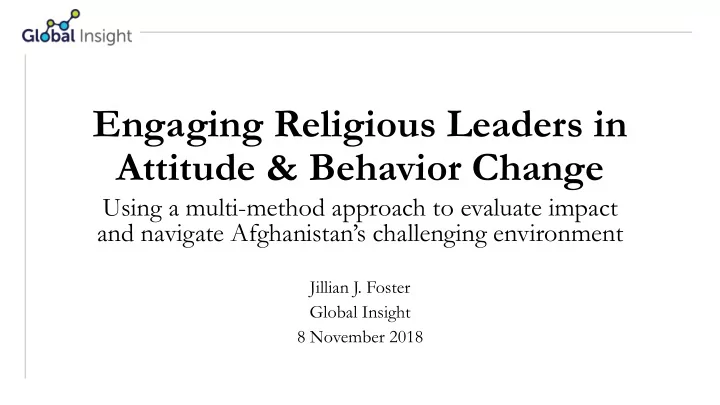

Engaging Religious Leaders in Attitude & Behavior Change Using a multi-method approach to evaluate impact and navigate Afghanistan’s challenging environment Jillian J. Foster Global Insight 8 November 2018
Global Insight specializes in research, M&E, and data with NGOs in fragile states. Our work employs a unique gender-sensitive, multi-method approach. gender (evaluation + research + data) 2
Context: Afghanistan • 23.1% women’s labor market participation (World Bank, 2017) • 39.7% girls’ primary school enrollment (World Bank, 2017) • 22% female government employees (UNDP, 2010) à only 9% in decision-making roles • 87% believe women require permission of husband to vote (DHS, 2004) 3
Context: Herat • 3rd largest city + extended villages network of villages • Relatively conservative • Restricted women’s physical mobility, access to public services and space, and ability to demand constitutional rights. 4
World Vision Program Design Objectives: 1. Engage communities in discussions around enhancing the capacity of women leaders in Herat for meaningful participation 2. Support the government in Herat to more actively encourage women’s participation in civil and political activities. Locations: Injil, Guzara, Karokh, Kohsan, Zindejan, Ghoryan, and Koshk Rabatsangi districts 5
World Vision Program Design Activities: 1. Gender in Islam curriculum training-of-trainers program with local faith leaders. 2. Capacity building for 120 women shura representatives to organize locally. 3. Women shura TORs developed in consultation with the DoWA and quarterly women shura meetings to support advocacy efforts at district and provincial government offices. 4. Establishment of 24 community change groups who develop and implement one community action plan each. 5. Coordination with the DoWA and DoRA for improved implementation of the NAPWA. 6
World Vision Program Design Activities: 1. Gender in Islam curriculum training-of-trainers program with local faith leaders. 2. Capacity building for 120 women shura representatives to organize locally. 3. Women shura TORs developed in consultation with the DoWA and quarterly women shura meetings to support advocacy efforts at district and provincial government offices. 4. Establishment of 24 community change groups who develop and implement one community action plan each. 5. Coordination with the DoWA and DoRA for improved implementation of the NAPWA. 7
Engaging Faith Leaders Gender in Islam curriculum training-of-trainers program with local faith leaders 1. UNDP Gender in Islam curriculum adapted to local context 2. Initial cohort: 40 “lead” faith leaders 3. Lead faith leaders train: 760 faith leaders in remote areas 8
Demographics: Faith Leaders Baseline (%) Endline (%) 24 total surveys 139 total surveys Age 18-35 16.7 44.6 36-50 66.7 38.8 51+ 16.7 16.5 Education No schooling 13.0 0.7 Primary complete (grade 6) 13.0 23.7 Secondary complete (grade 12) 34.8 28.1 University degree 39.1 47.5 9
Research Questions • In environments with particularly rigid social norms and poor records on women’s rights, what is the effect of engaging traditional leaders in changing the attitudes and behaviors of their constituents? • How might it prove useful to engage traditional leaders from within their religious texts and institutions, rather than from external sources and paradigms? 10
Research Design 1. Secondary Data & Literature Review 2. Faith Leader Survey (139) 3. Faith Leader Key Informant Interviews (9) 4. Household Survey (394) 5. Women Shura Key Informant Interviews (22) 6. Women Shura Focus Group Discussion (3) 7. Community Change Group Focus Group Discussion (9) 11
Findings Faith leaders personally changed their beliefs and behaviors around women’s rights • Allowed own daughters to attend/extend school • 8.8% point increase in faith leaders support for women’s rights 12
Findings 74.8% of faith leaders were approached by faith leaders who did not participate in the project about learning to promote women’s rights in their communities. 84.2% of faith leaders noticed faith leaders who did not participate in the project promoting women’s rights. 13
Findings Faith leaders spoke in favor of women’s rights during Friday prayers Faith Leader Promotes Women’s Rights “It is important to promote women’s at Friday Prayer (HH Surveys) rights. After preaching people may come to faith leader and ask ‘Why you are that much in favor of women? What happened to you?’ It is based in Islamic values to talk about women’s rights.” - Faith Leader, 50 years old, Guzara 14
Findings Coordination between women shura councils and faith leaders “There was a man that was addicted to opium. He was very violent with his wife, so we (women shura) involved the mullah from the religious department and also we invited [the] district governor to come and help us solve the problem. Finally we were successful to get her divorced.” - Woman shura, 43 years old, Zeyarate Jah 15
Challenges Weakness of baseline data Data collection in security compromised spaces Gender segregation Sensitive research questions 16
Solutions Weakness of baseline data Triangulate data Data collection in security Constant coordination with security compromised spaces team and enumerators, daily field check-ins Gender segregation Mixed-sex enumerator teams, meeting women where they feel most comfortable Sensitive research questions Local adaptation 17
Thank you Global Insight specializes in research, M&E, and data with NGOs in fragile states. Our work employs a unique gender-sensitive, multi-method approach. Jillian J. Foster Global Insight & Yale University g-insight.org jillian.foster@g-insight.org 18
Recommend
More recommend